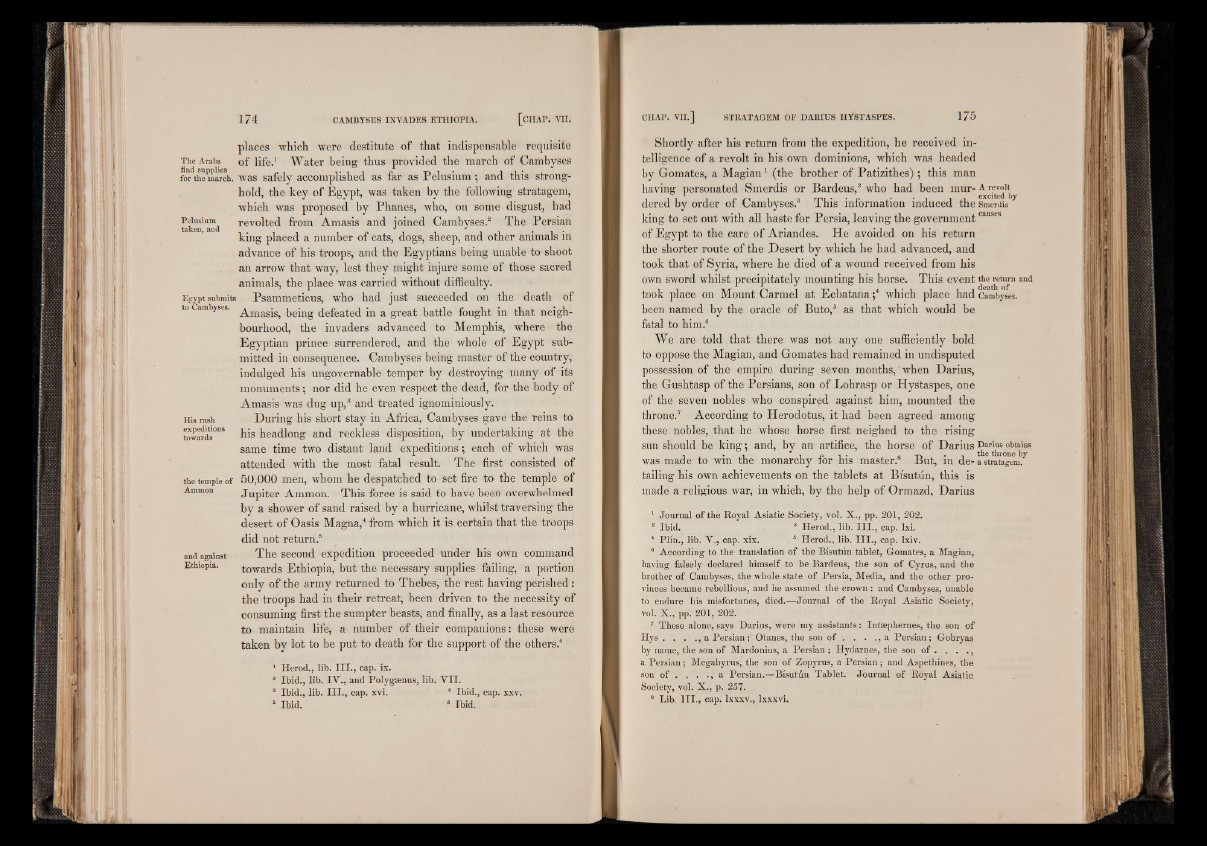
places which were destitute of that indispensable requisite
The Arabs of life.1 Water being thus provided the inarch of Cambyses
for the march, was safely accomplished as far as Pelusium; and this stronghold,
the key of Egypt, was taken by the following stratagem,
which was proposed by Phanes, who, on some disgust, had
Pelusium revolted from Amasis and joined Cambyses.8 The Persian taken, and ^ , . .
king placed a number of cats, dogs, sheep, and other animals in
advance of his troops, and the Egyptians being unable to shoot
an arrow that way, lest they might injure some of those sacred
animals, the place was carried without difficulty.
Egypt submits Psammeticus, who had just succeeded on the death of
to ambyscs. ^ masjs> being defeated in a great battle fought in that neighbourhood,
the invaders advanced to Memphis, where the
Egyptian prince surrendered, and the whole of Egypt submitted
in consequence. Cambyses being master of the country,
indulged his ungovernable temper by destroying many of its
monuments; nor did he even respect the dead, for the body of
Amasis was dug up,3 and treated ignominiously.
His rash During his short stay in Africa, Cambyses gave the reins to
towards°nS his headlong and reckless disposition, by undertaking at the
same time two distant land expeditions; each of which was
attended with the most fatal result. The first consisted of
the temple of 5 0 , 0 0 0 men, whom he despatched to set fire to the temple of
Ammon Jupiter Ammon. This force is said to have been overwhelmed
by a shower of sand raised by a hurricane, whilst traversing the
desert of Oasis Magna,4 from which it is certain that the troops
did not return.5
and against The second expedition proceeded under his own command
Ethiopia. towards Ethiopia, but the necessary supplies failing, a portion
only of the army returned to Thebes, the rest having perished:
the troops had in their retreat, been driven to the necessity of
consuming first the sumpter beasts, and finally, as a last resource
to maintain life, a number of their companions: these were
taken by lot to be put to death for the support of the others.6
1 Herod., lib. I I I . , cap. ix.
8 Ibid., lib. IV ., and Polygaenus, lib. V II.
8 Ibid., lib. I I I ., cap. xvi. 4 Ibid., cap. xxv.
5 Ibid. ‘ Ibid.
Shortly after his return from the expedition, he received intelligence
of a revolt in his own dominions, which was headed
by Gomates, a Magian1 (the brother of Patizithes); this man
having personated Smerdis or Bardeus,2 who had been mur- a revolt # excited by
dered by order of Cambyses.3 This information induced the Smerdis
king to set out with all haste for Persia, leaving the governmentcauses
of Egypt to the care of Ariandes. He avoided on his return
the shorter route of the Desert by which he had advanced, and
took that of Syria, where he died of a wound received from his
own sword whilst precipitately mounting his horse. This event the return and
took place on Mount Carmel at Ecbatana ;4 which place had Cambyses.
been named by the oracle of Buto,5 as that which would be
fatal to him.6
We are told that there was not any one sufficiently bold
to oppose the Magian, and Gomates had remained in undisputed
possession of the empire during seven months,' when Darius,
the Gushtasp of the Persians, son of Lohrasp or Hystaspes, one
of the seven nobles who conspired against him, mounted the
throne.7 According to Herodotus, it had been agreed among
these nobles, that he whose horse first neighed to the rising
sun should be king; and, by an artifice, the horse of Darius Darius obtains
- i i • i i i p i •was made to win the monarchy for hi s maEs ter. Hi -B»u t, in de-Pa® s ttrhartoangeem b.y
tailing his own achievements on the tablets at Bisutun, this is
made a religious war, in which, by the help of Ormazd, Darius
1 Journal of the Royal Asiatic Society, vol. X ., pp. 201, 202.
8 Ibid. 3 Herod., lib. I I I . , cap. lxi.
4 Blin., lib. V., cap. xix. , 5 Herod., lib. I I I . , cap. lxiv.
6 According to the translation of the Bisutun tablet, Gomates, a Magian,
having falsely declared himself to be Bardeus, the son of Cyrus, and the
brother of Cambyses, the whole state of Persia, Media, and the other provinces
became rebellious, and he assumed the crown : and Cambyses, unable
to endure his misfortunes, died.—Journal of the Royal Asiatic Society,
vol. X., pp. 201, 202.
7 These alone, says Darius, were my assistants: Intsephernes, the son of
H y s ................. a Persian f Otanes, the son of . . . ., a Persian; Gobryas
by name, the son of Mardonius, a Persian ; Ilydarnes, the son of . . . .,
a Persian; Megabyrus, the son of Zopyrus, a P e rsian ; and Aspethines, the
son o f ................a Persian.—Bisutiin Tablet. Journal of Royal Asiatic
Society, vol. X., p. 257.
8 Lib. I I I ., cap. lxxxv., Ixxxvi.